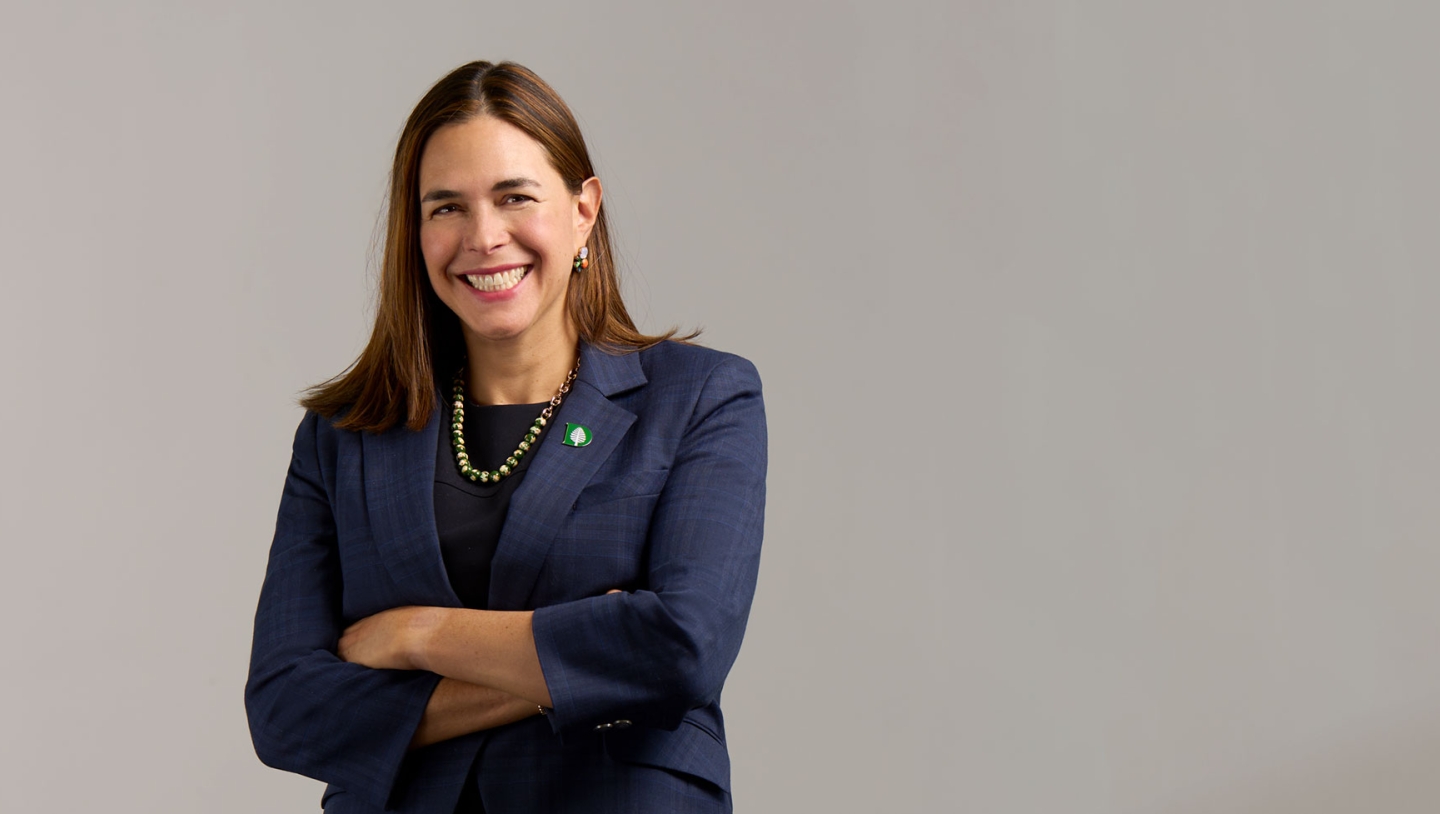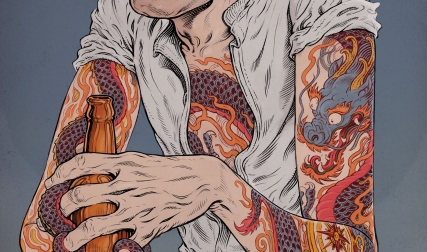Ask Sian Beilock about a period in her life that she’s nostalgic for, and she hesitates. Not because she hasn’t had memorable moments—there was the rager she threw in high school when her parents went out of town, the road trip she took with college friends to find the Overlook Hotel from The Shining, and the winters she spent skiing with her family in Northern California.
She just isn’t wired to focus on the past.
“That’s an interesting question,” Beilock says before pausing for seven full seconds. (I counted.) We are sitting in her bright, spacious office at Barnard College in New York City. Books and family photographs line the shelves, though not for much longer. This summer, Beilock will swap the blue couch I’m sitting on for a green one, and the Barnard magazines covering her coffee table for stacks of this very publication. That’s when she’ll leave her post as president of Barnard to become Dartmouth’s new president.
“I don’t feel there’s a time in my life I wish I could go back to,” she says, finally. “If anything, I wish I’d taken more time to enjoy instead of always looking at what’s next, which is a common theme in my life: What am I going to do next? How am I going to achieve?”
A cognitive scientist, Beilock has spent her career studying why people choke under pressure, whether in a boardroom, on a golf course, or while taking the SATs. But glance at her CV, and you’d be forgiven for wondering whether she knows much at all about failure.
When she was 32, the University of Chicago granted Beilock tenure as a professor of psychology. During her 12 years there, she ran the human performance lab, where her research investigated how and why people succeed or fail in high-stress situations. Her books, Choke (2010) and How the Body Knows Its Mind (2015), catapulted her into the mainstream. Her TED talk has racked up nearly 2.5 million views. By 40, she’d ascended to executive vice provost and an officer of the university.
In 2017, at the age of 41, she became Barnard’s eighth president. That same year, she won the Troland Award from the National Academy of Sciences for her pioneering work on anxiety and performance. Now, at 47, she will become Dartmouth’s first female president in the College’s 254-year history—and the youngest president in the Ivy League. She starts July 1, succeeding Phil Hanlon ’77.
“People ask me, ‘How did she get to where she is? What did you and her dad do to raise her?’ ” says Beilock’s mom, Ellen, who lives in Oakland, California. “We mostly left her alone because she was on autopilot….She just was on her own trajectory.”
Sian was born in Berkeley, California. Her parents named her after the Welsh actress Siân Phillips, whom they’d seen in a BBC series about the women’s suffrage movement (Shoulder to Shoulder, 1974). That choice led to one of the most persistent questions of Beilock’s life: How does she pronounce her name? “It was supposed to be ‘Shawn,’ but my parents thought it was ‘See-on,’ so here I am,” Beilock says, laughing. Both Barnard and Dartmouth have published YouTube videos of Beilock explaining how to say her name.
In the Beilock family, working hard was “in the air,” says Ellen, a retired intellectual property lawyer and mediator. Her husband, Steven, was a litigator and partner at his law firm. “Sian’s dad was a pusher,” she adds. “He worked long hours and put a lot of pressure on himself. Although we didn’t put pressure on the kids, they saw by example—it’s in their blood.”
Growing up, Beilock and her younger brother learned to ask questions and challenge assumptions. Whenever they got in trouble, their parents skipped long talks at the dinner table in favor of written memos. “I had a really big party at my house, and I got in a lot of trouble,” she says. “There were hundreds of people there. I did go around to all of my neighbors the next day and apologize and ask them not to tell my parents, but it did not work.”
“Her father and I sent her a memo, like a lawyer,” Ellen says. “You know: ‘We’ve had a discussion about this, and this is our understanding. You will not do this. You will not do that.’ It was probably legalese, but we wanted to be clear.”
In preschool, Beilock asked her parents to send her to kindergarten a year early. They obliged. By second grade, she demanded to switch from her progressive private school, where children learned at their own pace, to the local public school, where she’d receive a more traditional education. Ellen still remembers Sian’s response when her daughter learned she could change schools: “Oh Mommy, that will be so great. I never liked the feeling of people being ahead of me.”
“She was like a rocket ship taking off—she was always going to do huge things.”
In elementary school Beilock played on the boys’ soccer team and dreamed of being a jockey, then an astronaut. At Piedmont High School she excelled in math and science and was a top athlete, walking onto the varsity basketball team as a freshman, competing on the ski team one winter, running cross country, and playing arguably the most high-stress position on the soccer team: goalie.
“She wanted to be good at everything she did,” says Doyle O’Regan, Beilock’s cross-country coach and math teacher at Piedmont. “Sian had talent and a drive to succeed, so I really didn’t have to do much to motivate her. If anything, my primary job was to get her to relax and try not to force things. Concentrate on the process instead of the outcome.”
One of the defining moments in her early life occurred when she was 16. Beilock was a star goalie in the Olympic development program, but when the national coaches came to scout, she played the worst game of her career. It curtailed her dream of making the national team. She never played soccer again, but the experience has become a key talking point in her research on choking under pressure. “Being able to pivot and not get bogged down in something going wrong—that’s such an important skill,” she says. “You’ve got to learn how to fail.”
Beilock wanted to go East for college, but she stayed close to home to be near her father, who’d been diagnosed with leukemia when she was in high school. A lifelong athlete, Steven played on University of California, Berkeley’s varsity swim and water polo teams. He was such a devoted Cal Bears football fan that when Beilock once received a job offer at Stanford (Cal’s rival), her younger brother blurted, “You can’t go!” Their father died in 2008 of interstitial fibrosis while waiting for a lung transplant. “I still miss him every day,” she says.
As an undergrad at the University of California, San Diego (UCSD), Beilock majored in cognitive science and played club lacrosse. Friends describe her as “smart and capable,” “adventurous and funny,” and competitive as hell. “She was like a rocket ship taking off—she was always going to do huge things,” says Scott Kopchinsky, a software engineer in San Diego and friend from UCSD.
“We were suitemates freshman year. I met her on the day we were moving in,” says Elizabeth Thornton, a lawyer in Washington, D.C. “My mom was like, ‘Well don’t run off to Mexico first thing!’ And we did. That was with Sian, me, and some friends in our suite.”
As graduation neared, Beilock flirted with the idea of law school, but her mother gently intervened. “I took her around to talk to my lady lawyer friends about their lives. Nobody particularly advocated a life in the law,” Ellen says. “Sian didn’t have to have such a constrained life as her father and I did. She would have had a glowing career as a lawyer, but she followed her passions—sports, psychology, performance.”
Everything crystallized for Beilock when she and her mom attended a UC-Berkeley panel discussion of female scientists. One of the speakers explained how failure is integral to the scientific process. “I was like, ‘Wow, you could make a career, and you don’t have to get it all right?’ I was pretty intrigued by that,” Beilock recalls. After college, she earned doctorates in psychology and kinesiology from Michigan State University. Following two years at the University of Miami as an assistant professor of psychology, she landed at the University of Chicago.
Wherever Beilock goes, she leaves a trail of achievements in her wake. There’s her cognitive science research that’s helped scores of people meet their potential under stress. There are the programs she spearheaded as executive vice provost at Chicago, such as UChicagoGRAD, which gives graduate students and postdocs a pipeline to jobs in academia, government, nonprofits, and other fields. At Barnard, she launched Feel Well, Do Well, a campus-wide health and wellness initiative; steered the college through the Covid-19 pandemic; and created Access Barnard to guide international, first-generation, and low-income students through their college experience.
“She projects an incredible mix of judgment, vision, and confidence,” says Katherine Kinzler, professor and department chair of psychology at the University of Chicago. “She really cares about people in her life, both professionally and personally.”
Beilock often talks about having multiple selves—researcher, professor, president, friend. “When I screw up in one, I can fall back on another. It’s psychologically healthy,” she says. But she has yet another side: Mom.
Beilock has a 12-year-old daughter, Sarah, who was born a few years after Beilock made tenure at University of Chicago. (Sarah’s father, Beilock’s longtime partner, splits his time between Chicago, Italy, and soon, Hanover.) “I remember trying to sleep train her and starting to cry. I just couldn’t do it. Everyone swears by it, but I had to figure out what was right for me,” Beilock says. As time went by, she learned, as all parents do, that what’s right for her isn’t always right for her child. Beilock vowed to dress Sarah in unisex clothes and have a Barbie-free home, but life intervened. Sarah not only ended up with “every Barbie,” including the coveted Dreamhouse, but she wore princess gowns and tiaras every day for two years. “It’s kind of like the failure thing—you just learn. My ideals: I had to let them go.”
At University of Chicago, she recalls going to 7 a.m. administrative meetings after Sarah was born. “I said to the general counsel, ‘This is not family-friendly,’ and she’s like, ‘Yup!’ ” Beilock laughs. “At Barnard, I had the opportunity to talk about these other aspects of who I was, and that became really important, because I want to model for everyone—especially women—that it’s messy but you can do it.”
Now that Sarah is a tween, Beilock must contend with new challenges: homework, social media, friends. In further proof of her ability to perform under pressure, she successfully navigated Ticketmaster’s botched rollout of Taylor Swift’s Eras Tour, scoring tickets for herself and Sarah this spring in New Jersey. Wherever they go—Columbia women’s basketball games, tennis lessons, shopping—Beilock looks for ways to lovingly embarrass her daughter, whether holding her hand in public or popping into the background when Sarah is on FaceTime with her friends. “She is very responsible, like I was,” says Beilock. “She does her homework. She pushes hard. I worry about some of that. I’m always wondering if I’m doing it the right way. And I know there’s not one right way to do it.”
For centuries, Ivy League presidents have been a fraternity of white men, many of whom graduated from the very institutions they led. That reign ended in 1994, when the University of Pennsylvania tapped Judith Rodin to lead. This year, six of eight Ivies will have women at the helm, including Claudine Gay, Harvard University’s first Black president; Nemat “Minouche” Shafik, Columbia University’s first female leader; and Beilock.
Being a “first” can be tricky territory. When Drew Faust became Harvard’s first female president in 2007, she famously said at a news conference on the day of her confirmation, “I am not the woman president of Harvard. I am the president of Harvard.” Later, she revisited that statement on NPR: “I was immediately challenged to balance that response by letters from young women saying how much it meant to them that there was a woman president of Harvard and what a role model I was and would be.”
Beilock prefers not to choose. “I do think my gender, my experiences being an ‘only’ in the sciences, my experience as a mom—all of that contributes,” she says. “I have lots of other credentials besides being a woman that I think are really important, but I’m happy to have it front and center with everything else.”
When Beilock moves to Hanover with Sarah and their dog, a Cavapoo named Rosie, she’ll miss the energy and fast pace of New York City as well as her morning routine—dropping Sarah off at school on the East Side, then running home through Central Park. But Dartmouth’s bucolic setting won’t slow her down. “Our small size and having this focus on undergraduates in an ecosystem of a top research university—it’s like no other,” she says. “I think my role is to help people think about how being smaller, more porous, more cross-disciplinary can be to Dartmouth’s advantage. In what areas can we absolutely be the best?”
Her mother, meanwhile, wonders what else is waiting for her daughter in Hanover. “Dartmouth will be a whole new world for Sian—with a lot of trees!” Ellen says. “I’m hoping she’ll have more opportunities for balance in her life, not always to be pushing so hard.”
Not surprisingly, Beilock has her own plans. In our final moments together, I ask her to reflect on all she’s accomplished. “I told you—I’m bad at it. All I’m doing is thinking about what we’re going to do at Dartmouth,” she says. “I look forward. I’m ready to go. I’m excited. I’m humbled, you know, to be taking on this role. Maybe I should get better at reflecting on the past. But I’m ready to go.”
Abigail Jones is a journalist in New York City. She chairs the DAM editorial board.




